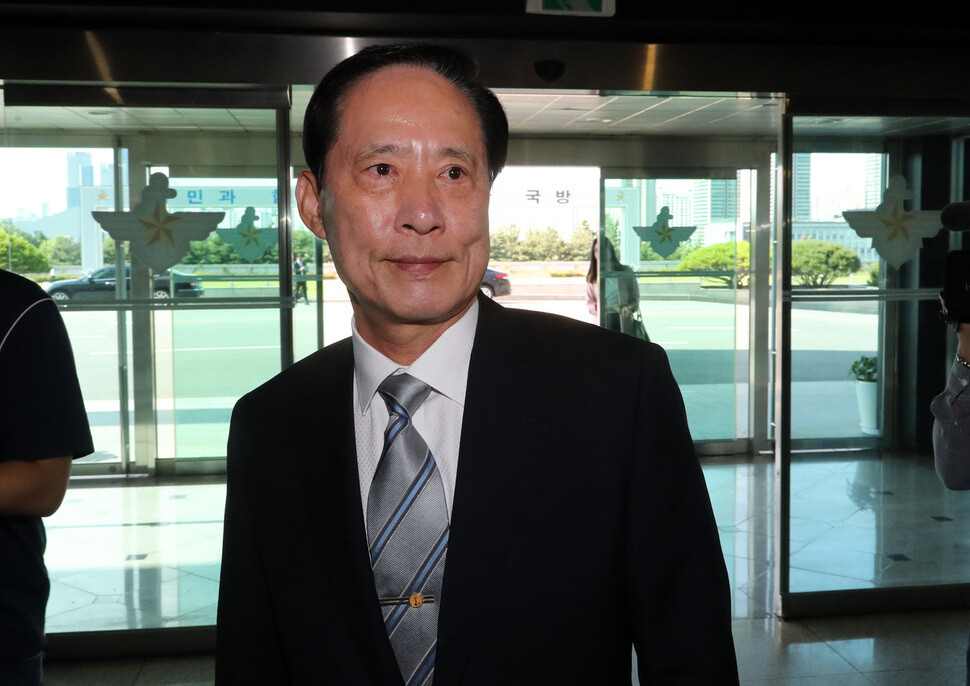hankyoreh
Links to other country sites 다른 나라 사이트 링크
Defense Minister nominee says reform means building a new military

“Defense reform isn’t a negative thing - it means building a new military,” said Song Young-moo, nominee for Defense Minister. Song’s remarks seem aimed at addressing concerns inside the military that Song, who is not from the army, along with Vice Minister Suh Choo-suk, who does not have a military background at all, will push through tough reforms in an army-focused military system.
“When it comes to defense reform, the word ‘reform’ has come to have the negative meaning of fixing what’s wrong, trimming the fat and getting rid of what’s unnecessary,” Song said when reporters asked him about defense reform while he was visiting the Defense Ministry on June 12. “But what I’m thinking about isn’t that kind of negative defense reform.”
“The paradigm of war for the army, navy and air force is changing, along with the battlefield environment and weapon systems, so I‘m saying we should be thinking about a new military that would upgrade the old format,” Song explained. This appears to mean improving the military’s operational methods to bring them in line with warfare today.
While explaining his plan for military reform, Song also asked reporters not to refer to him as “a defense minister with a background in the navy.” The remark was calculated at countering predictions that a candidate from the navy would focus on structural reforms in a military that is organized around the army. “From the time I was a captain until I was an admiral, I worked at the Joint Chiefs of Staff, moving up from section chief to department head. I’m someone who knows about all the branches - army, navy and air force,” he emphasized.
“After the Korean War, the army protected our country’s rebirth in a time of poverty, and the army carried out its mission in that time, undergoing major hardship while it was being built,” Song said, in apparent recognition that the army is nearly certain to undergo changes during the process of reform.
Song also raised eyebrows with his use of the phrase “North Korean puppet regime.” While the remark appears to have been aimed at conservatives who have been anxious about security since Moon’s took office as president, some regard the word as being inappropriate.
“What I value the most from my life in the military and my entire life are the memories of conflicts such as the Battle of Yeonpyeong [June 15, 1999] and how [the results] will go down in history. It’s because North Korea-let’s call them the North Korean puppet regime. This was the first conflict between the regular militaries of North Korea and the Republic of Korea since the Korean War, in which we won a complete victory,” he said.
“After North and South Korea agreed on mutual respect in the Inter-Korean Joint Statement on July 4, 1972, Korea Central Intelligence Agency Director Lee Hu-rak proposed not using the expression ’North Korean puppet regime’ any more, which was the government’s official policy. Since the inter-Korean summit in 2000, the phrase has not been used in defense white papers,” said Kim Yeon-cheol, a professor at Inje University.
The term “puppet regime” was derived from the view that North Korea was being manipulated by the Soviet Union during the Cold War, but given the North‘s current relationship with Russia and China, it no longer corresponds with reality. “‘North Korean puppet regime’ is not an appropriate expression for a leader in charge of high-level governmental decisions to use,” said Yang Moo-jin, a professor at the University of North Korean Studies.
By Kim Ji-eun, staff reporter
Please direct questions or comments to [english@hani.co.kr]

Editorial・opinion
![[Column] Has Korea, too, crossed the Rubicon on China? [Column] Has Korea, too, crossed the Rubicon on China?](https://flexible.img.hani.co.kr/flexible/normal/500/300/imgdb/original/2024/0419/9317135153409185.jpg) [Column] Has Korea, too, crossed the Rubicon on China?
[Column] Has Korea, too, crossed the Rubicon on China?![[Correspondent’s column] In Japan’s alliance with US, echoes of its past alliances with UK [Correspondent’s column] In Japan’s alliance with US, echoes of its past alliances with UK](https://flexible.img.hani.co.kr/flexible/normal/500/300/imgdb/original/2024/0419/2317135166563519.jpg) [Correspondent’s column] In Japan’s alliance with US, echoes of its past alliances with UK
[Correspondent’s column] In Japan’s alliance with US, echoes of its past alliances with UK- [Editorial] Does Yoon think the Korean public is wrong?
- [Editorial] As it bolsters its alliance with US, Japan must be accountable for past
- [Guest essay] Amending the Constitution is Yoon’s key to leaving office in public’s good graces
- [Editorial] 10 years on, lessons of Sewol tragedy must never be forgotten
- [Column] A death blow to Korea’s prosecutor politics
- [Correspondent’s column] The US and the end of Japanese pacifism
- [Guest essay] How Korea turned its trainee doctors into monsters
- [Guest essay] As someone who helped forge Seoul-Moscow ties, their status today troubles me
Most viewed articles
- 1[Column] The clock is ticking for Korea’s first lady
- 2After 2 months of delayed, denied medical care, Koreans worry worst may be yet to come
- 3Hong Se-hwa, voice for tolerance whose memoir of exile touched a chord, dies at 76
- 4Samsung barricades office as unionized workers strike for better conditions
- 5[Column] Has Korea, too, crossed the Rubicon on China?
- 6US overtakes China as Korea’s top export market, prompting trade sanction jitters
- 7[Editorial] As it bolsters its alliance with US, Japan must be accountable for past
- 8[Correspondent’s column] In Japan’s alliance with US, echoes of its past alliances with UK
- 9All eyes on Xiaomi after it pulls off EV that Apple couldn’t
- 10[Guest essay] How Korea turned its trainee doctors into monsters